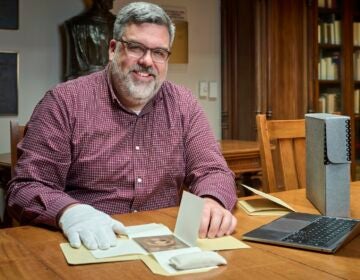Early career researchers at Penn want to form a union, which the university is challenging
Organizers say they want better job security, protections against being fired unfairly and salaries that keep up with the cost of living.
Listen 1:38
Justin Roncaioli is a postdoc researcher at the University of Pennsylvania. (Kimberly Paynter/WHYY)
From Philly and the Pa. suburbs to South Jersey and Delaware, what would you like WHYY News to cover? Let us know!
More than 1,000 postdoctoral scholars and research associates at the University of Pennsylvania want to unionize.
In April, the group petitioned with the National Labor Relations Board to form a union.
These are early career researchers who have a doctoral degree, and can help drive research projects and mentor graduate students, while learning from professors. This effort comes on the heels of medical residents and graduate student workers at the university unionizing in the past two years.
Organizers say they want better job security, protections against being fired unfairly and salaries that keep up with the cost of living.
They also say the university challenged their status as workers who can unionize.
Last Tuesday, the National Labor Relations Board held a hearing about the case. The organizers say they are incredibly disappointed in the university’s decision to challenge their petition, and may rally to pressure the school administration.
A group of 11 city councilmembers and state representatives sent a letter to the university announcing their support of the union effort.
In a statement, a spokesperson from the University of Pennsylvania said they greatly value their “postdoctoral trainees and research associates and their significant contributions to the University’s research mission,” as embodied through mentorship, professional development and support for their careers. The spokesperson also said the school encourages the postdocs and research associates to “learn as much as they can about what unionization might mean for them.”
Konstantinos Plakas, a postdoctoral researcher in radiology and one of the organizers, said that by calling the postdocs “trainees,” the university is trying to diminish their research contributions. He pointed out that postdocs and research associates do get training, but also do research as soon as they are hired, advancing the work of the faculty member they work under.
“It sounds like Penn is, through their actions, trying to diminish these contributions, while also saying, ‘Oh, we deeply value you,'” Plakas said.
The postdocs and research associates want to organize so they can keep doing their work sustainably, said Justin Roncaioli, an organizer and a postdoctoral researcher in the department of pathobiology at Penn’s School of Veterinary Medicine.
Roncaioli was in a union as a graduate student at the University of California Berkeley, and said the union helped increase salaries to keep up with the cost of living.

“We don’t want to feel like we’re taking a step back financially, family-wise. A lot of us are putting our lives on hold … for these positions,” he said. “We love doing research and we love making discoveries, and we think that we deserve treatment and pay and benefits that reflect … the passion that we put into our projects and our research and the results that we get out of them.”
More than half of the postdoctoral researchers at Penn come from outside the U.S., with visas tied to their positions, so their status is even more precarious, said Albane Théry, a postdoctoral researcher in the department of mathematics.
“It can be great, even though it’s not the most stable position and the most well-paid, but it can really turn out to be horrifying when things go wrong,” she said. “There is a potential for abuse from our direct supervisors … threatening to withdraw your contract and therefore your visa. If you have a family and someone says you will lose your job and your visa, this is like a nightmare.”
Théry is from France and said she has had an easier time because she has a three-year visa, so she feels comfortable speaking up without fear of retaliation, but she doesn’t know other international postdocs who have a similar arrangement.
“I’ve been in the situation that I would want everyone to be in. And this has not been the case for people around me,” she said.
The organizers at Penn join more than 10 other universities where postdocs have organized to form unions, including Rutgers University.
WHYY is your source for fact-based, in-depth journalism and information. As a nonprofit organization, we rely on financial support from readers like you. Please give today.





